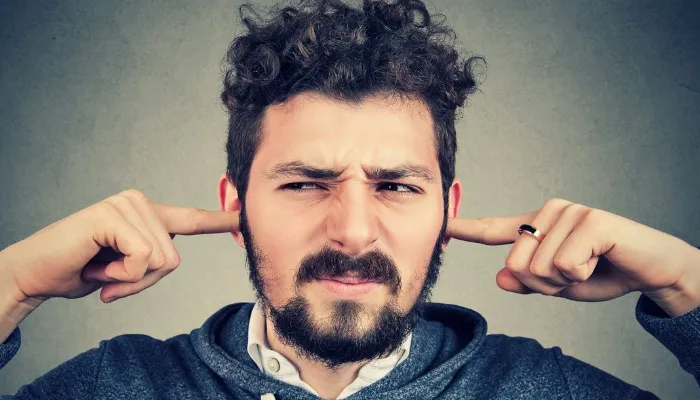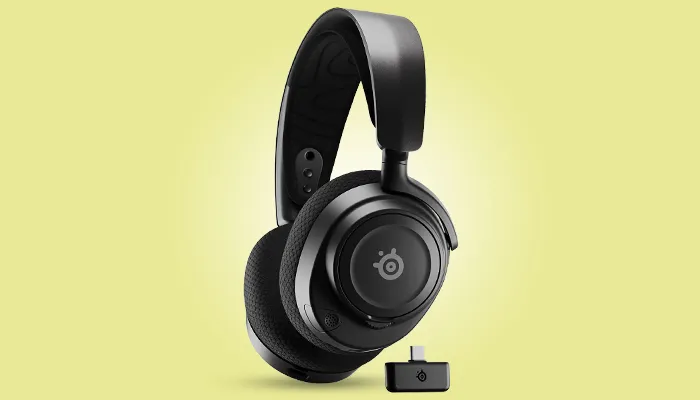Ever wonder if those long hours chatting with your gaming buddies online might be doing permanent damage to your hearing? The truth is, gaming headsets can potentially lead to tinnitus or ringing in the ears.
You love playing your favorite games and connecting with friends, but you only get one set of ears—so you need to protect them. Loud noises, especially over long durations, are one of the leading causes of tinnitus.
And while gaming headsets allow you to become deeply immersed in gameplay and coordinate with your squad, they also expose your ears to noises at volumes and for lengths of time that can be harmful.
The good news is a few simple precautions can help ensure many more years of happy, healthy gaming and social time with friends. Keep reading to learn the truth about gaming headsets and tinnitus and how you can prevent potential hearing damage.
What Is Tinnitus and What Causes It?
So you’ve started noticing an annoying ringing or buzzing in your ears that just won’t go away. Chances are, it’s tinnitus caused by prolonged use of your gaming headphones. The good news is, that there are a few things you can do to prevent permanent damage and find relief from this irritating condition.
Volume Control is Key
The number one thing you can do is turn down the volume on your headphones. Loud noises are enemy number one when it comes to tinnitus, so blasting audio into your ears for hours on end is a surefire way to make symptoms worse or permanent.
A good rule of thumb is that if the audio sounds distorted or you can’t hear ambient noises in your environment, the volume is too high.
Take Frequent Breaks
Give your ears regular breaks from headphone use. Take off your headset for at least 10 to 15 minutes for every hour you have them on.
During breaks, avoid any background noise or audio stimulation. The silence will give your ears time to recover from high sound levels and prevent further damage.
Use Noise-Canceling Headphones
Noise-canceling headphones are a great alternative to traditional headsets. They block outside ambient noise using special technology but play audio at safe, moderate levels.
This helps reduce overall sound exposure while still allowing you to enjoy gaming and music.
See a Doctor if Symptoms Persist
If your tinnitus symptoms don’t start to improve with self-help measures or you develop hearing loss or dizziness, it’s time to see your doctor.
They can check for any underlying conditions and may recommend other treatment options like sound therapy, counseling, medication, or in severe cases, surgery to provide relief.
The key is to take action now to prevent your tinnitus from becoming a permanent fixture in your life. Protect your hearing and give your ears the break they need.
With some simple lifestyle changes, you can overcome this condition and get back to enjoying your favorite hobbies without annoying distractions.

How Gaming Headsets Can Lead to Tinnitus
If you’re an avid gamer, you probably use gaming headphones for hours at a time to fully immerse yourself. While these headphones enhance your experience, they also expose your ears to dangerously high sound levels that can lead to tinnitus.
Tinnitus causes ringing, buzzing or roaring sounds in your ears that aren’t from an outside source. Prolonged use of gaming headphones is a major contributor because they’re designed to amplify certain frequencies.
Over time, this unnatural sound exposure damages your inner ear and auditory processing, increasing your risk of tinnitus.
To avoid this, limit how long you wear your gaming headphones to 1-2 hours at a time. Take at least a 10 to 15 minute break after each hour of use so your ears can recover.
During breaks, remove your headphones completely and avoid any loud noises. If possible, use noise-canceling headphones which block background noise so you can play at lower volumes.
Keep the volume moderate when you do use your headphones. While you want an immersive experience, sound levels over 85 decibels can cause permanent damage after just 2 hours.
If you already experience ringing in your ears, give your headphones a break. Reducing sound exposure is key to preventing your symptoms from worsening.
Your hearing and ear health are too valuable to put at risk for the sake of gaming. By following some simple precautions, you can continue enjoying your hobby without damaging your ears or developing tinnitus.
Take breaks, limit use, keep volumes in check and let your ears recover. If you start noticing ringing or muffled hearing, see your doctor right away. Protecting your hearing now means enjoying many more years of gaming in the future!

Preventing Tinnitus While Using Gaming Headsets
To avoid developing tinnitus from your gaming headset, there are several important preventive measures you can take. As a gamer, your hearing health is vital, so protecting yourself from long-term damage should be a top priority.
Limit Headset Use
Wearing your gaming headset for extended periods can contribute to tinnitus. Try to limit use to 1-2 hours at a time. Take a break for at least 10-15 minutes in between sessions to give your ears a rest. Removing the headset completely during breaks is best.
Observe Safe Volume Levels
Keep the volume at a moderate level, around 60-70% of the maximum. As a rule of thumb, if the volume is uncomfortable for someone else to listen to from a few feet away, it’s too loud. The louder and longer the exposure, the higher your risk of tinnitus.
Use Noise-Canceling Headsets
Noise-canceling gaming headsets are excellent at blocking excess sound while still allowing you to hear the game. They reduce the amount of noise reaching your ears, which helps prevent hearing damage and tinnitus. Look for noise-canceling headsets certified by an independent testing company to ensure maximum protection and performance.
Ensure a Proper Fit
Ill-fitting gaming headsets can create an airtight seal, trapping loud noises close to your eardrums. Make sure your headset fits snugly but comfortably over your ears. An improper fit reduces the effectiveness of noise cancelation and exposes you to dangerously high sound levels.
Give Your Ears a Break
Even with the best preventive measures, prolonged headset use can still cause tinnitus or hearing loss over time. Take a day or two off from gaming each week to rest your ears. Your hearing health is worth the sacrifice.
Limit screen time and audio stimulation as much as possible during breaks. Your ears will thank you, and you’ll be back to gaming at full power in no time.
With some mindfulness about volume levels, limiting use, and giving your ears adequate rest, you can enjoy your gaming headset without worry. Make hearing health a priority and take good care of your ears—you only have one pair, so keep them in the game for life!

Treatment Options for Tinnitus Caused by Gaming Headsets
Once you’ve been diagnosed with tinnitus caused by gaming headset use, the good news is there are several treatment options available. The key is finding what works for you, as everyone experiences tinnitus differently.
Reduce Exposure to Loud Noises
The first step is limiting the time you use your gaming headset and giving your ears adequate breaks when you do use them. Only wear your headset for 1-2 hours at a time, and take 15 minute breaks each hour.
During breaks, remove the headset completely and avoid any other loud noises. Reducing sound exposure is key to preventing further damage and allowing your ears to recover.
Lifestyle Changes
Making changes to reduce stress and relax can help ease tinnitus symptoms. Try relaxation techniques like yoga, meditation, or deep breathing. Getting enough sleep, limiting alcohol and caffeine intake, and exercising regularly may also help.
For some, biofeedback therapy is effective for learning how to control the body’s responses to stress and anxiety. These lifestyle changes and alternative therapies may significantly reduce your perception of tinnitus sounds.
Medication
If lifestyle changes aren’t helping, certain medications may reduce your tinnitus. Antidepressants or anti-anxiety medications are commonly prescribed, as they work by calming the parts of the brain that process sound and emotion.
The medications won’t cure the underlying cause of your tinnitus but can make the sounds less bothersome. Talk to your doctor about medication options and possible side effects.
Cochlear Implants
For severe tinnitus that does not improve with other treatments, cochlear implants may be an option. Cochlear implants are small electronic devices surgically implanted in the inner ear to stimulate the auditory nerve.
They can help mask tinnitus sounds or even eliminate them in some cases. Cochlear implants do come with risks like any surgery, so discuss the pros and cons with your doctor.
The key to managing tinnitus from gaming headsets is prompt diagnosis and finding the right combination of treatments for your needs.
Don’t lose hope—with time and treatment, tinnitus sounds can become less bothersome or even fade into the background. Be patient and keep working with your doctor to explore options and find relief.

Tips for Choosing the Right Gaming Headset
When it comes to choosing a gaming headset, there are a few key factors to consider. Finding the right headset can enhance your gaming experience while also protecting your hearing. Here are some tips to help you make an informed decision:
1. Comfort is Key
Look for a headset that offers a comfortable fit, especially if you plan on wearing it for extended periods. Opt for adjustable headbands and cushioned ear cups that provide a snug yet cozy feel. Remember, a comfortable headset can make all the difference during those intense gaming sessions.
2. Consider Sound Quality
Great sound quality is essential for an immersive gaming experience. Look for headsets that offer clear, crisp audio and a wide frequency range.
This will allow you to hear every detail, from subtle in-game sounds to explosive effects. Additionally, consider headsets with surround sound capabilities for a more realistic audio experience.
3. Wired or Wireless?
Decide whether you prefer a wired or wireless headset. Wired options tend to offer a more stable connection and lower latency, ensuring minimal lag during gameplay.
On the other hand, wireless headsets provide greater freedom of movement and eliminate the hassle of tangled wires. Choose the option that best suits your gaming style and preferences.
4. Noise-Canceling Technology
If you often play in noisy environments or want to focus solely on your game, consider investing in a headset with noise-canceling technology.
These headsets use advanced algorithms to block out background noise, allowing you to immerse yourself fully in your gaming world without having to crank up the volume.
5. Durability and Build Quality
Gaming headsets can endure a fair amount of wear and tear, so it’s important to choose a durable option. Look for headsets made from sturdy materials that can withstand the rigors of intense gaming sessions. Reinforced cables and solid construction will ensure that your headset stands the test of time.
Remember, finding the perfect gaming headset is a personal choice. Consider your budget, gaming preferences, and the features that matter most to you. By following these tips, you can find a headset that not only enhances your gaming experience but also keeps your hearing protected.
You Might Like: 11 Most Expansive Gaming Headsets in 2023
FAQs
Using gaming headsets for long periods can potentially lead to tinnitus or other hearing issues. Here are some frequently asked questions about gaming headsets and tinnitus.
Conclusion
So now you know, while gaming headsets aren’t the sole cause of tinnitus, they can potentially contribute to or worsen symptoms in some cases. The good news is there are some easy precautions you can take.
Give your ears a break from the headphones when you can, turn down the volume to a reasonable level, and consider noise-canceling or open-back headsets which don’t completely seal off your ears. Your hearing health is worth it.
Tinnitus can be managed, but prevention is always better. Game on, but do it responsibly and your ears will thank you later.
- Charging Bluetooth Headphones During Use: Is It Possible? - January 9, 2024
- Why Over-Ear Headphones Best for Hearing Health? (7 Reasons) - December 12, 2023
- Fixing the Bose Earbuds Not Charging in Case Problem: Solutions That Work - November 24, 2023
